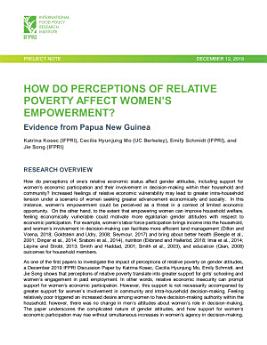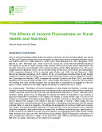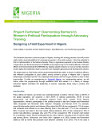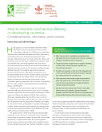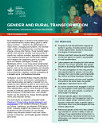How do perceptions of relative poverty affect women's empowerment? Evidence from Papua New Guinea
Kosec, Katrina · Mo, Cecilia Hyunjung · Schmidt, Emily · Song, Jie
Dec 2019 · Intl Food Policy Res Inst
Ebook
6
Pages
family_home
Eligible
info
reportRatings and reviews aren’t verified Learn More
About this ebook
How do perceptions of one's relative economic status affect gender attitudes, including support for women's economic participation and their involvement in decision-making within their household and community? Increased feelings of relative economic vulnerability may lead to greater intra-household tension under a scenario of women seeking greater advancement economically and socially. In this instance, women’s empowerment could be perceived as a threat in a context of limited economic opportunity. On the other hand, to the extent that empowering women can improve household welfare, feeling economically vulnerable could motivate more egalitarian gender attitudes with respect to economic participation. For example, women's labor force participation brings income into the household, and women's involvement in decision-making can facilitate more efficient land management (Dillon and Voena, 2018; Goldstein and Udry, 2008; Seymour, 2017) and bring about better health (Beegle et al., 2001; Dinçer et al., 2014; Sraboni et al., 2014), nutrition (Ekbrand and Halleröd, 2018; Imai et al., 2014; Lépine and Strobl, 2013; Smith and Haddad, 2001; Smith et al., 2003), and education (Qian, 2008) outcomes for household members. As one of the first papers to investigate the impact of perceptions of relative poverty on gender attitudes, a December 2019 IFPRI Discussion Paper by Katrina Kosec, Cecilia Hyunjung Mo, Emily Schmidt, and Jie Song shows that perceptions of relative poverty translate into greater support for girls’ schooling and women’s engagement in paid employment. In other words, relative economic insecurity can prompt support for women's economic participation. However, this support is not necessarily accompanied by greater support for women’s involvement in community and intra-household decision-making. Feeling relatively poor triggered an increased desire among women to have decision-making authority within the household; however, there was no change in men’s attitudes about women’s role in decision-making. The paper underscores the complicated nature of gender attitudes, and how support for women's economic participation may rise without simultaneous increases in women's agency in decision-making.
Rate this ebook
Tell us what you think.
Reading information
Smartphones and tablets
Install the Google Play Books app for Android and iPad/iPhone. It syncs automatically with your account and allows you to read online or offline wherever you are.
Laptops and computers
You can listen to audiobooks purchased on Google Play using your computer's web browser.
eReaders and other devices
To read on e-ink devices like Kobo eReaders, you'll need to download a file and transfer it to your device. Follow the detailed Help Center instructions to transfer the files to supported eReaders.
